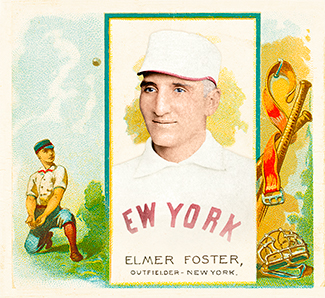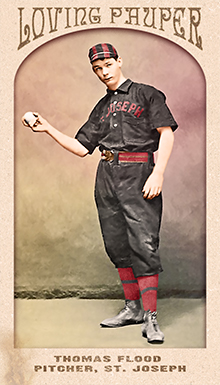
- Series: 1880s: Loving Paupers
- City: St. Joseph
- Team: Clay Eaters
- League: Western Association
Thomas J. Flood (1867-?) never made it to the major leagues, but his Old Judge card series in 1889 placed this young Missouri ballplayer among an elite of his day. He was captured by the photographer in his St. Joseph Clay Eaters uniform cutting a dashing figure as a right-handed pitcher. Indeed, The Sporting News noted that Thomas had been the Houston Babies’ star hurler the prior year, going 11-15 for a struggling franchise. He was again the stalwart of that team in ‘88 when he compiled a miserable record of 2-10, but started the majority of games, completing the entire dozen. Only one of that squad’s pitchers ever had big league experience. That was veteran Doc Landis who was in the final year of his career that had begun with American Association teams in 1882. The Texas Southern League in those days consisted of a mere six clubs, including the San Antonio Missionaries and Dallas Hams. Flood had started out with amateur outfits in his native St. Louis, such as the Prickly Ash and Grand Avenue clubs. The Sporting News mentioned his first professional job was with Springfield, MO in 1887 where he was said to have won every start for the Indians of the Southwestern League. Unfortunately, Flood’s auspicious beginning ended abruptly with the demise of the Springfield franchise. He was picked up by Ft. Smith to finish the season. With the Clay Eaters, Thomas found himself among a staff with better talent. Five of his fellow pitchers would see big league service. He went 9-16 in ‘89, the third-best record on the team.
- Despite missing out on MLB glory, Flood was celebrated by The Sporting News as “the finest pitcher in the Southwestern League.” Not a bad clipping to show the family
Auction History
Cartophilia
Old Judge Pose: 164-4
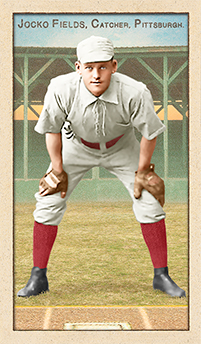
- Series: Beginnings: 1880's
- City: Pittsburgh
- Team: Alleghenys
- League: National League
John Joseph Fields (1864-1950) was named, by Hight Heat Stats, the starting left fielder for the All Emerald Isle Nine. This is, perhaps, less a tribute to Jocko than a commentary on the endeavors of Irish immigrants of the 19th century, who may have had more mundane occupations as they settled into their adopted land. Nevertheless, the list puts Fields in good company with Tommy Bond, Tony Mullane and Jack Doyle among the squad. Jocko was mostly a part-timer in the majors, starting with Pittsburgh's Alleghenys in 1887 where he played two more seasons. The uproar of labor strife in 1890 led to the Players' League founding and Fields tried his luck with the Burghers. Despite being led by Jake Beckley's formidable bat, the rest of the team didn't give much support and they languished in sixth place. Fields did have a decent year, hitting .281, well below his previous season's output when he hit .311. The PL did offer youngsters like Jocko more playing time, however, and he saw more action in '90 than any other campaign. He got into 126 games and drove in 86, nearly half of his six-year career total. He returned to the Pirates in '91 and was shipped to Philadelphia for a handful of games at the end of that season. A final try with the Giants in '92 lasted only 21 games and proved his swan song. Jocko's pro career had begun with the Jersey City Skeeters in 1885 followed by three NY teams in '86 before the Alleghenys called. He stayed in the game through the 1896 season for such teams as the Macon Hornets, Charleston Seagulls and Evansville Black Birds. He split his final tour between the Atlanta Crackers and Norfolk Braves. If nothing else, baseball provided a way for a young immigrant lad to really see the country.
- Fields' last few years in the minors saw him hit as well as he ever had. He averaged .351 for Charleston, and a combined .326 for those last two clubs in '96
- Series: 1888 Champion New York Giants
- City: New York
- Team: Giants
- League: National League
Elmer Ellsworth Foster (1861-1946) was an outfielder with the New York Metropolitans, New York Giants and Chicago Colts over a six year span beginning in 1886. The very rare baseballer who threw left and batted right, Foster achieved a career batting average of .187.
- One of the first five major leaguers born in Minnesota
- Played at Haverhill with future Hall of Famers Wilbert Robinson and Tommy McCarthy
- Noted for his speed on the base paths, Foster always had an explanation if caught stealing: “Why, I wasn’t a bit tired. Why should I have stopped running?”
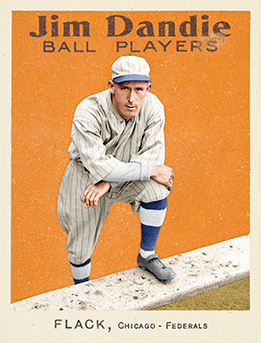
- Series: Jim Dandie Feds
- City: Chicago
- Team: Whales
- League: Federal League
Max John Flack (1890-1975) was a left-handed outfielder who played a dozen seasons in the majors in Chicago and St. Louis. He compiled a career average of .278 with little power but considerable speed, stealing 200 bases over his tenure. In recent years a shadow has been cast over this journeyman's reputation as his status as the “goat” of the 1918 World Series has been looked at in more sinister terms with the uncovering in 2007 of documents pertaining to the Black Sox scandal. An affidavit by Ed Cicotte indicates he and his wayward teammates felt “inspired” by the Cubs' loss to Boston the year before. Flack's dubious performance in the Series made him an object of suspicion. He remains the only player to be picked-off twice in a World Series game. His throwing error in game six provided the margin of victory to Babe Ruth's Sox. However, a review of the box scores for the '18 Series shows the Cubs were charged with six errors and Flack committed only the one that led to Boston's only scores in the finale (in the third inning). There were a number of noteworthy aspects to that Series beyond speculation of misconduct. Due to the war, it became the only Fall Classic to be played entirely in September. The Cubs eschewed their home park (later to be named Wrigley Field) in favor of vaunted Comiskey Park (“The Baseball Palace of the World”). Although it would not be named the national anthem until 1931, game one was graced with the first performance of the Star Spangled Banner at a major league game. And, of course, it would be mourned by Boston fans for another 86 years as the last championship as the Curse of the Bambino took hold. So, if Max did engage in mischief, he did so on a grand stage, but there is nothing but unfortunate circumstance to implicate him.
- Flack had debuted with the Federal League's Chicago “Chi-Feds” (later the Whales) in 1914
- He remained in town with the Cubs following the demise of the upstart league the next year, playing regularly for six seasons before moving to the Cardinals as a reserve for four more
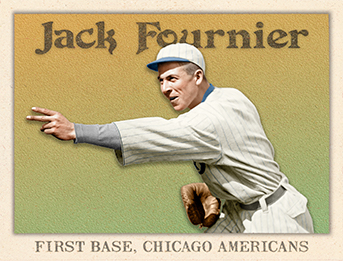
- Series: Diamond Heads '15
- City: Chicago
- Team: White Sox
- League: American League
John Frank Fournier (1889-1973) has been ranked by Bill James as the 35th-best first baseman of all-time. Yet, his inability to play the position competently left the managers of his five major league teams in a constant quandary. He got his ranking at the plate, not afield. Always a good hitter, as his career progressed, Jack put up numbers with the best of the era. His career BA was .313 in 15 ML seasons and he really soared when the Cardinals dealt him to Zack Wheat's Brooklyn Robins. From 1923-26 Fournier averaged .337 and slugged 82 homers. His performance with the bat only improved as he aged. A recent ranking of hitters in their Age 34 to 36 seasons shows Fournier among twenty of the best ever. In fact, only he and Gavvy Cravath failed to make the Hall after achieving what he did in his mid-thirties. And he was no slouch in his twenties. Jack began his professional endeavors with Seattle in the Northwestern League in 1908. The teenager knocked around the west coast until the White Sox came calling in 1912. In two years he was hitting .300 and rarely dipped below that threshold thereafter. Had his glove been as magnetic as his body, Jack may have played even more—he led the league in being hit-by-pitch three times.
- Fournier may well have been the most mis-matched player of his day. The stratagems of the Dead Ball era dictated many bunts, a particular weakness for the sturdy fielder. And one is left to imagine the hits he'd have had with a livelier ball
- Jack almost quit the game rather than report to the Robins. He relented and went on to the best years of his career, despite leading the NL in errors his first season in Brooklyn


